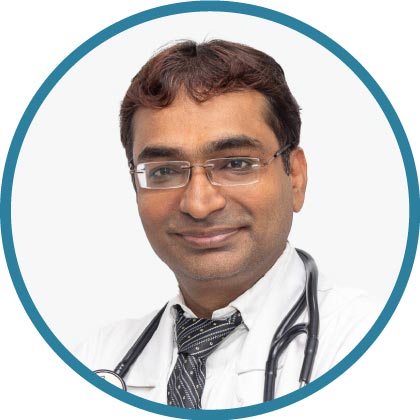Home Treatment for Tuberculosis: Remedies, Diet & Care
Discover home treatment for tuberculosis, including natural remedies, diet, hygiene tips, and lifestyle changes to support recovery and boost immunity.

Written by
Last updated on 3rd Jul, 2025
Introduction
Tuberculosis (TB) is a serious bacterial infection that primarily affects your lungs but can also spread to your other body parts. The disease is caused by Mycobacterium tuberculosis, which spreads through airborne droplets when an infected person coughs, sneezes, or speaks. If untreated, TB can cause severe lung damage, weight loss, and long-term health complications. Fortunately, TB is curable with proper treatment and a strong immune system.
Besides treatment, you can also consider Home treatment for tuberculosis that focuses on strengthening your immune system, improving lung function, and preventing complications. Proper nutrition, adequate rest, and stress management can also play a significant role in helping your body fight the infection. While medical treatment is necessary, home remedies can complement conventional TB care to speed up your recovery.
Symptoms of Tuberculosis
Recognising early symptoms of TB can help in early diagnosis and treatment, preventing severe complications.
1. Early Signs to Watch For
You may have TB if you experience:
Persistent cough lasting more than three weeks.
Unexplained weight loss even without diet changes.
Fatigue and weakness that do not improve with rest.
Fever and night sweats, often recurring.
Loss of appetite, leading to nutritional deficiencies.
If you notice these early symptoms, seeking medical help immediately can prevent TB from worsening.
2. Symptoms that Require Immediate Medical Attention
If TB is left untreated, it can cause severe complications. Seek urgent medical attention if you experience:
Coughing up blood (hemoptysis).
Severe chest pain and difficulty breathing.
High fever and chills that do not subside.
Persistent dizziness or confusion.
Ignoring these symptoms can damage your lungs and TB may also spread to your other organs.
The Role of Nutrition in TB Treatment
A nutrient-rich diet can play a major role in supporting your immune system and speeding up your recovery.
1. Foods that Strengthen Immunity
Including immune-boosting foods in your diet can help your body fight TB bacteria more effectively.
Protein-rich foods – Eggs, chicken, lentils, and nuts help repair body tissues.
Vitamin C-rich fruits – Citrus fruits, guava, and papaya improve immunity and healing.
Leafy greens – Spinach, kale, and broccoli provide essential antioxidants.
Dairy products – Milk, yogurt, and cheese supply calcium and probiotics for gut health.
A balanced diet ensures your body gets the necessary nutrients to combat TB.
2. Foods to Avoid
Certain foods can trigger inflammation and weaken immunity, delaying TB recovery.
Processed foods – Contain additives and preservatives that weaken digestion.
Sugary snacks – Excess sugar affects immune response.
Caffeinated beverages – Tea, coffee, and sodas can cause dehydration.
Red meat and fried foods – Difficult to digest and increase body heat.
Avoiding these foods can reduce inflammation and support your body’s healing process.
Herbs and Natural Remedies
In addition to prescribed medications, certain herbs and home remedies can support your immune system and help manage TB symptoms.
1. Herbal Supplements for Support
Some herbs have anti-inflammatory and immune-boosting properties that can aid in TB recovery.
Ashwagandha – Strengthens the immune system and helps with fatigue.
Turmeric – Contains curcumin, which has anti-inflammatory and antibacterial properties.
Garlic – Supports lung health and may reduce bacterial activity.
Ginger – Helps with digestion and relieves nausea caused by medications.
Including these herbs in your daily routine can enhance overall well-being during TB treatment.
2. Home Remedies and Their Benefits
Simple home remedies can provide relief from TB symptoms:
Honey and black pepper – Soothe the throat and help reduce coughing.
Warm milk with turmeric – Acts as a natural antibiotic.
Steam inhalation with eucalyptus oil – Clears congestion and promotes better breathing.
Gooseberry (Amla) juice – Rich in vitamin C, boosts immunity and aids healing.
These remedies can complement TB medications, helping you feel better faster.
Importance of Hygiene and Sanitisation
TB spreads through airborne droplets, making hygiene and sanitisation essential to prevent infecting others.
1. Preventing Infection Spread at Home
If you have TB, follow these practices to reduce the risk of spreading the infection:
Wear a mask when coughing or sneezing.
Use a tissue or elbow to cover your mouth when sneezing.
Keep windows open for proper ventilation.
Dispose of used tissues properly to prevent contamination.
Taking these precautions can protect family members from exposure.
2. Safe Practices for Family Members
If you live with someone who has TB, it’s important to take preventive measures:
Avoid close contact until the person is no longer contagious.
Disinfect commonly touched surfaces regularly.
Ensure proper nutrition and a healthy lifestyle to strengthen immunity.
Get tested for latent TB if you’ve been exposed.
Following these practices reduces the risk of transmission at home.
Lifestyle Modifications
A few lifestyle changes can support faster TB recovery and boost overall health.
1. Impact of Rest and Recovery
Your body needs ample rest to fight TB bacteria effectively. Lack of rest can prolong the healing process and worsen symptoms.
Aim for 7-9 hours of sleep each night.
Take short naps to conserve energy.
Reduce stress through breathing exercises and meditation.
Rest allows your immune system to function optimally, aiding a quicker recovery.
2. Importance of Regular Exercise
While excessive exertion can slow recovery, light exercise improves lung function and boosts energy levels.
Deep breathing exercises help improve lung capacity.
Gentle stretching or yoga can ease body stiffness.
Walking in fresh air enhances oxygen levels and mood.
Regular low-impact activity keeps your body strong without straining your lungs.
Medications Management at Home
Taking TB medications exactly as prescribed is essential for a complete cure and to prevent drug resistance.
1. Adherence to Prescription
Skipping doses or stopping treatment early can make TB bacteria resistant to antibiotics, leading to drug-resistant TB.
Take your medication at the same time daily.
Set reminders to avoid missing doses.
Complete the full treatment course, even if symptoms improve.
2. Managing Side Effects
TB medications can cause side effects like nausea, fatigue, or liver issues. Here’s how you can manage them at home:
Drink plenty of water to stay hydrated.
Eat small, frequent meals to reduce nausea.
Avoid alcohol and junk food, as TB medicines can strain the liver.
Report severe side effects to your doctor immediately.
Proper management of side effects ensures a smoother recovery without complications.
Psychological Support and Counseling
Tuberculosis can also affect your mental and emotional well-being. Coping with long-term treatment, isolation, and social stigma can be overwhelming, making psychological support crucial for recovery.
1. Coping with a TB Diagnosis
Being diagnosed with TB may make you feel stressed, anxious, or even depressed. It’s important to:
Stay positive and remind yourself that TB is treatable with proper care.
Educate yourself about TB to clear any misconceptions.
Seek emotional support from friends, family, or TB support groups.
Engage in relaxation techniques like meditation or deep breathing to manage stress.
Having a strong mental outlook can help you stay motivated throughout treatment.
2. Support for Family Members
If your loved one has TB, your support and encouragement can help them recover faster. As a family member, you should:
Encourage them to take medications on time.
Create a stress-free home environment to promote healing.
Help with meal preparation to ensure they get the right nutrition.
Take precautions like maintaining good hygiene and ventilation at home.
Your understanding and patience can make a huge difference in their recovery.
Monitoring and Follow-Up
Completing TB treatment requires regular monitoring and medical check-ups. Even if symptoms improve, stopping medication early or skipping follow-ups can lead to relapse or drug resistance.
1. When to Consult a Healthcare Professional?
You should contact a doctor immediately if you experience:
Persistent cough, chest pain, or difficulty breathing despite treatment.
Severe fatigue, weakness, or extreme weight loss.
Severe medication side effects like vomiting, skin rashes, or yellowing of the eyes.
New symptoms such as swollen lymph nodes, back pain, or joint stiffness.
Early medical intervention prevents complications and ensures successful recovery.
2. Importance of Regular Check-Ups
Your doctor will monitor your treatment progress through regular check-ups. These visits help to:
Ensure TB bacteria are being eliminated properly.
Identify and manage any side effects from medications.
Adjust the treatment plan if necessary.
Prevent relapse by confirming complete recovery.
Following scheduled medical appointments ensures faster and safer recovery.
Conclusion
Home care plays an important role in supporting TB treatment. Following a nutritious diet, maintaining hygiene, getting proper rest, and staying mentally strong can enhance recovery. Complementing medical treatment with home remedies helps boost immunity and manage symptoms better.
While home treatment helps, professional medical guidance is essential for curing TB completely. Regular consultations, medication adherence, and medical check-ups prevent complications and ensure a full recovery.
If you or a loved one has TB, make sure to follow prescribed treatment, eat well, and stay positive. With the right medical and home care, you can overcome tuberculosis and restore your health.
Consult Top Pulmonologist
Consult Top Pulmonologist

Santoshkumar P Hammigi
Pulmonology Respiratory Medicine Specialist
4 Years • MBBS,MD, (Respiratory Medicine)
Bengaluru
Apollo Medical Center, Marathahalli, Bengaluru
(25+ Patients)

Dr. Mary Susan K S
General Physician/ Internal Medicine Specialist
13 Years • MBBS, MD INTERNAL MEDICINE
Bengaluru
Apollo Clinic, Sarjapur Road, Bengaluru

Dr. Hyder
Pulmonology Respiratory Medicine Specialist
5 Years • MBBS, MD (PULMONOLOGY)
Guntur
Kalam chest and multi-speciality clinic, Guntur

Dr. Mahavir Bagrecha
Pulmonology Respiratory Medicine Specialist
14 Years • MBBS, MD (PULMONOLOGY)
Pune
Swash Chest and Diabetes Clinic, Pune
(50+ Patients)

Dr. P Sravani
Pulmonology Respiratory Medicine Specialist
3 Years • MBBS, MD
Visakhapatnam
Apollo Clinic Vizag, Visakhapatnam
